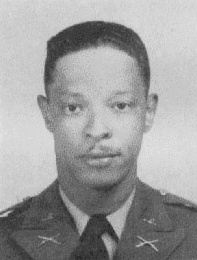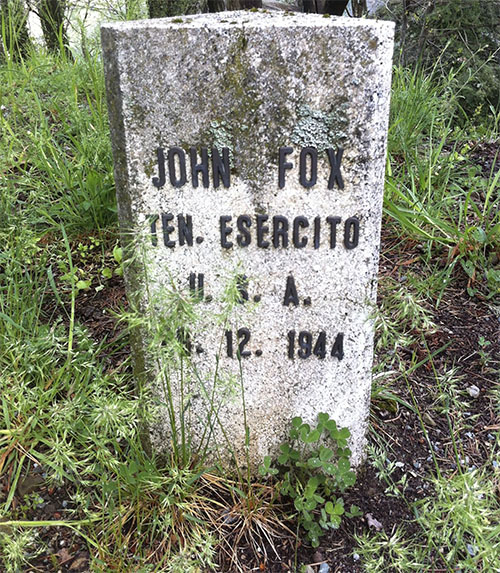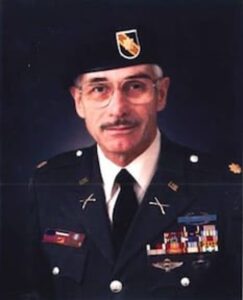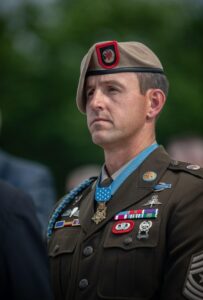by Cory M. Ackerman

John R. Fox, a native of Ohio, attended the Reserve Officer Training Corps (ROTC) program at Wilberforce University. Originally, Fox had attended the Ohio State University, but he transferred to Wilberforce because it was one of a handful of universities that permitted black Americans to join the ROTC. After completing his four-year program, he joined the U.S. Army in 1941 and received a commission as a second lieutenant. Fox was well-liked and a fair hand at playing poker, which served him well on ship as his unit crossed the Atlantic in March of 1944. They would spend the next few months traveling around Europe, doing guard and service duty, but not engaging in the combat for which they had trained. By November 1944, German forces had been pushed back to the Gothic Line on the Italian Front. Then, Fox and the rest of his unit, the 366th Infantry Regiment, escaped their rear-echelon duty and were assigned as combat soldiers to the Fifth Army as part of the 92nd Division.
On a cold morning in early December 1944, the 366th joined with other elements of the 92nd Division. Per the sanctioned discrimination of the day, the entire division was a segregated unit for black soldiers. The 92nd would be the only black infantry division to see combat in Europe during World War II. The division took for their symbol a buffalo, hearkening back to the black Buffalo Soldiers who fought for the United States after the Civil War. On that cold morning in 1944, the division received its new commander, Major General Edward Almond, who gave his troops a speech in which he is reported to have said, “I did not send for you. Your Negro newspapers, Negro politicians, and white friends have insisted on your seeing combat, and I shall see that you get combat and your share of the casualties.” The new general’s force had not been fully assembled yet. Fox and the rest of his company would not arrive until December 9, and within a few days, their long-time regimental commander, Colonel Howard Queen, had asked for and received a re-assignment. Queen had led the 366th for 22 months, and on December 11, 1944, he shipped home.
A few weeks later, on December 23, 1944, John Fox moved to the front and took his place in an observation post (OP) in the town of Sommocolonia. Fox had volunteered for duty over Christmas, a four-day stint. On Christmas Day, Fox shared with his men a cake that his family had sent him. Christmas was a subdued affair in the town as German mortar fire on the Allies had recently increased. What the Americans did not know was that the Germans were preparing an offensive, “Operation Wintergewitter” part of which would involve an attack on a quiet sector occupied by the relatively inexperienced troops of the 92nd Division. On December 26, starting at 4:50 am, small arms fire and artillery began to rain down on Sommocolonia. This action was Fox’s first while serving as forward observer, and his first on the front line ever.
As the Italian partisans guarding the village called for support, Fox quickly realized that the attacking force, the size of which was difficult to estimate due to the dark, was too close for artillery interdiction because of the danger of hitting friendly forces. Another officer fired a mortar barrage that forced the attackers to retreat. But, the brief encounter was a prelude to the full German attack to follow; shortly after the pre-dawn firefight Axis soldiers approached the village from two directions. They outnumbered the village’s defenders almost three to one. A relief force sent to aid the Americans and partisans holding the village ran into a German ambush and retreated. By mid-morning German troops were in Sommocolonia and some Germans had infiltrated the village. The defenders were low on ammunition, and there were no plans in place to get them more. As the German and Italian fascist forces closed on the American positions, Fox had called artillery fire closer and closer to the village, trying to delay the attackers and prevent more of them from entering the village.

The Americans had been ordered to “hold at all costs,” but their positions were rapidly unraveling under the relentless enemy assault. Fox ordered his men to retreat, and then issued the last fire request he would ever give: an artillery strike directly on his position. He was warned the coordinates he called in were right on top of him. Nevertheless, Fox repeatedly affirmed the coordinates, ending by saying “Fire It! There’s more of them than there are of us. Give them hell!” Fox died in the ensuing barrage, possibly due to enemy fire. His body was recovered a week after the Axis attack, when an Allied offensive retook Sommocolonia. His sacrifice allowed some Allied troops and Italian civilians to escape, delayed the German offensive by at least a day, and resulted in the death of a great number of the attackers. In 1982, 38 years after his death, John Fox received the Distinguished Service Cross (DSC), following a push by people who knew him or knew of him. Fox had not been recommended for an award by his superiors at the time, but the evidence compiled convinced then-Secretary of Defense Clifford Alexander to approve a DSC for Fox.
John Fox’s Distinguished Service Cross would be upgraded in 1997 following a review of potential discrimination in the recognition of black heroism during World War II. President Bill Clinton said during the ceremony, “A soldier who receives the Medal of Honor usually needs no further description. But we must remember something else here today. These heroes distinguish themselves in another almost unique way. In the tradition of African-Americans who have fought for our nation as far back as Bunker Hill, they were prepared to sacrifice everything for freedom even though freedom’s fullness was denied to them.”
On the day Arlene Fox, John’s widow, received his Medal of Honor, she said this, “We never needed any medals. John just felt that we were as good as anybody else, and he was going to prove it, and he did.” Today we honor Lieutenant Fox’s sacrifice on our behalf, and remember the heroism of all black soldiers in the service to our nation.




